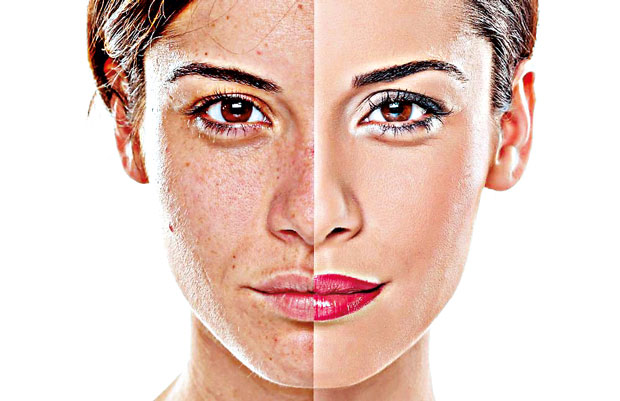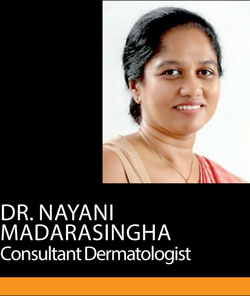19 Jan 2018 - {{hitsCtrl.values.hits}}

 When recalling your teenage years there may be many good memories that make you yearn for the good old days. However past acne problems might discourage you from wanting to reminisce your teen years. Tough luck if you are in your youth and facing an acne battle. This week’s edition of the Health Capsule will help you understand and better equip yourself with the reinforcements that you need to survive the ever-existing battle between youth and acne.
When recalling your teenage years there may be many good memories that make you yearn for the good old days. However past acne problems might discourage you from wanting to reminisce your teen years. Tough luck if you are in your youth and facing an acne battle. This week’s edition of the Health Capsule will help you understand and better equip yourself with the reinforcements that you need to survive the ever-existing battle between youth and acne.
Consultant Dermatologist, Dr. Nayani Madarasingha spoke about acne and addresseed all issues that revolve around this topic.
“Acne (also known as pimples) is a disorder of the sebaceous glands. Sebaceous glands are oil glands located in your skin. They are connected to the hair follicles. Secretions of the sebaceous glands open to the skin through the pores in your skin. When the pores of the skin get blocked, secretions accumulate. This leads to inflammation followed by bacterial infection subsequently causing acne,” explained Dr. Madarasingha.
This condition commonly occurs in adolescents during the initial stages of hormonal changes that they undergo. However some people in their middle ages too fall victim to acne. Acne conditions prevail persistently during adolescence, but improves after reaching the age of 20. However there is a smaller percentage who suffer from acne longer-term, even upon reaching ages 30-40.
Causative Factors 
Dr. Madarasingha speaks about the causes of acne. “Reagents in creams and other substances that you apply on your face, (fairness creams, etc) can lead to acne. Hormonal imbalance disorders such as polycystic ovarian disease can lead to acne. Acne emerges as a symptom to polycystic ovarian disease amongst other symptoms such as obesity, hair loss and menstrual problems. These are the most common causes for acne,” she mentioned. It is said that food items such as dairy products and sweets can aggravate acne. However this does not affect all people and it causes acne only in some.
“Acne starts off as a comedone commonly known as white heads and black heads. Due to inflammation, they become larger and red in colour. Upon bacterial infection, they become yellow due to pus. Acne could aggravate into a very severe condition which appear in the form of lumps and cysts,” she informed.
Permanent damage
Once acne heals, dark spots are left in the skin. This is known as acne pigmentation. The Dermatologist stated that pigmentation caused by acne usually fades away on its own unless the condition is severe and has caused scarring. “Scars are caused by permanent damage to the skin and may not completely dissappear,” she warned.
It is very important to focus on how to control acne. “Acne leaves pigmentation on the skin. This black mark fades away with time. But in severe cases of acne, a scar is left behind. This causes permanent damage to the skin and may not heal. Therefore in order to prevent scars, early treatment during acne is important,” Dr. Madarasingha stressed.
Treatment
The treatment of acne depends on the severity of the condition. This ranges from light acne break out to moderate or severe conditions. “When it comes to severe stages, taking oral medication becomes necessary in order to control it. Additional treatment such as chemical peels are also done to control acne. People often have the tendency to request medication over the counter at a pharmacy or sticking to a medication that their friends follow. This is not encouraged. It is important to keep in mind that treatment of acne depends on your type of skin and the severity level of acne,” she advised.
Acne treatment takes a time period of about 3-6 months. It is not something that can be decided or done in the last minute. Early consultations with your dermatologist is of importance,” she explicated. By appropriate and early treatment through medication the chance of seeing scars left behind from acne can be minimized. Dr. Madarasinghe also highlighted that once acne is controlled medication should not be stopped. “Medication should be continued for 3-6 months,” she stated.
The treatment for acne scars also depends on the type of skin and type and severity of the scars. There are different treatments available namely chemical peels, microneedling, laser and platelet rich plasma (PRP). “Treating scars can take a very long time ranging from 6-12 months and repeated sessions are needed. These treatments will reduce the visibility of scars very successfully,” she added.
Prevention
On the prevention of acne, there are limitations regarding what we can do to prevent acne from breaking out. But it is essential to keep these facts in mind and follow them. Avoiding the use of various creams on your face sans consultation is one such way you could prevent acne. The most important factor is not to prick or pop pimples as the tendency of scarring your skin increases when you meddle with your acne.
Next is a factor that doesn’t affect everybody, but a small fraction of people. That is the diet. Foods such as sweets and dairy products have the probability of causing and aggravating acne in some patients. They should be careful when consuming such foods and should try to avoid them.
All in all, acne is a condition that requires medical attention. “Very effective medicine is available to control acne. It is important to keep in mind that early treatment can prevent acne scars,” Dr. Madarasingha concluded.
23 Dec 2024 26 minute ago
23 Dec 2024 31 minute ago
23 Dec 2024 1 hours ago
23 Dec 2024 2 hours ago
23 Dec 2024 3 hours ago